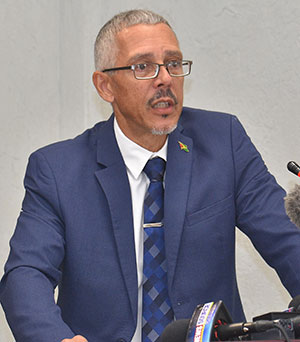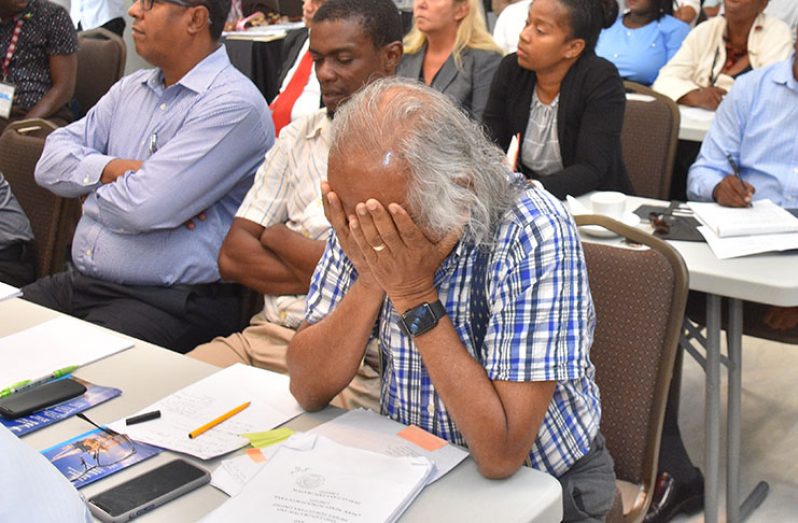–Min Gaskin roasts oil-contract critics
MINISTER of Business Dominic Gaskin came out swinging on Tuesday, taking a dig at those critics who have been daily finding fault with the government over its handling of developments here since the discovery of oil.
The occasion was a one-day oil-and-gas forum organised by the Private Sector Commission (PSC), which saw in attendance the likes of Mr Christopher Ram, who is among the fiercest critics of the Exxon agreement.

For starters, Minister Gaskin said that the vast majority of Guyanese he has met would like to see the oil and gas industry get off the ground, and to know they can benefit.
And to those persons who’ve repeatedly stated that the production-sharing agreement the government has signed with Exxon is “bad for Guyana” among other negatives, Minister Gaskin said that the US$300M this country stands to make come 2020, the first year of production, “is not chicken feed” as they have been wont to say.
To bolster his argument, he made the point that whereas it took the government eight years to make around the same amount of money from gold, it now stands to do it in just one year from oil and gas.
And on the subject of the oil contract with Exxon, Minister Gaskin said that he cannot fault the previous administration for the contents of the agreement it signed back in 1999 with Exxon. “Who knows where we would have been today had we not signed that contract back in 1999,” he said.
Noting that, that initial agreement has since been nullified by both Exxon and the government, Minister Gaskin went on to explain that back in 1999, there was no formal negotiation process.
“The company had a valid agreement with the Government of Guyana, which was not up for re-negotiation,” he said, adding that one cannot unilaterally amend a contract after the other party has invested large sums of money under terms of the said contract.

He said, too, that contrary to popular opinion, government ministers do not negotiate oil-production agreements, adding that there seems to be a concerted effort to derail the process regarding the progress of an industry which will bring much-needed transformation to Guyana.
QUESTION OF ROYALTY
As to those comparing Guyana’s 2% royalty with the 10% Ghana earns from its agreement with Exxon, Minister Gaskin said they very well know that they are looking at two types of agreements.
He said that whereas Guyana has a royalty and production-sharing agreement with Exxon, from which it stands to receive a 2% royalty and a 50% profit oil, Ghana on the other hand receives a 10% royalty and a 35% corporation tax from its property in its royalty and taxation model contract with the oil company.
He said, too, that the oil company enjoys an import tax waiver here, just as it does with Ghana, but has no value-added tax liability with the African country.
And while Ghana has stronger legislation than Guyana when it comes to governing the sector, Minister of Natural Resources Raphael Trotman has plans to update the existing petroleum legislation, and to introduce moves to better prepare Guyana for the sector, including the introduction of Local Content Policy.
“We will face challenges in the management of this sector,” Minister Gaskin said, adding that the government is currently reviewing the second draft of the local-content policy.
“We would like to see local participation when it comes to employment, especially at the higher-skilled levels,” he said, adding that training, local ownership of companies providing goods and services to the sector, as well as knowledge transfer from foreign to local are among the areas government would like to see coming to fruition.
Noting that the government will be guided by the prevailing best practices as the sector evolves, Minister Gaskin said:
“Guyana has a large amount of oil and a small population,” and that by 2030, is likely to be one of the top oil-producing countries per capita.
Meanwhile, Inter-American Development Bank (IDB) Country Representative, Sophie Makonnen, told the gathering that Guyana is at a critical juncture in its history, as she pointed out the sector’s importance regarding the populace.
And PSC chairman, Eddie Boyer, besides urging that the private sector work hand in hand with the government, also commended the government on its establishment of the Department of Energy.












